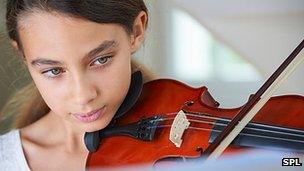Childhood music classes 'help adult hearing'
- Published

Do short-lived music lessons pay-off ?
Children who take music lessons have better hearing as adults, a study in the Journal of Neuroscience suggests.
It found that children who played an instrument, even for as little as one to five years, had enhanced brain responses to complex sounds.
Compared with those who had never taken music classes, they were better at recognising different frequencies.
This improved hearing ability can help listeners follow conversations in noisy environments, such as restaurants.
Report author Prof Nina Kraus said: "Based on what we already know about the ways that music helps shape the brain, the study suggests that short-term music lessons may enhance lifelong listening and learning.
"We infer that a few years of music lessons also confers advantages in how one perceives and attends to sounds in everyday communication situations, such as noisy restaurants.
Neural processing
"The way you hear sound today is dictated by the experiences with sound you've had up until today."
While previous work has indicated music can be good for the brain, this is the first study to suggest the effects are long lasting, even after people have given up the hobby.
The team tested the responses of 45 adults to different complex sounds ranging in pitch, using electrodes to measure brain activity.
The adults were grouped depending on how much music training they had had as children - no experience, one to five years of training, or six to 11 years of music instruction.
The people who had studied music even for just a few years had more robust neural processing of the different tests sounds.
They were particularly effective at being able to pull out the "fundamental frequency", the lowest frequency in sound, needed when listening to speech and music in noisy environments.
Prof Kraus said: "We help address a question on every parent's mind, 'Will my child benefit if she plays music for a short while?'"
- Published13 September 2011